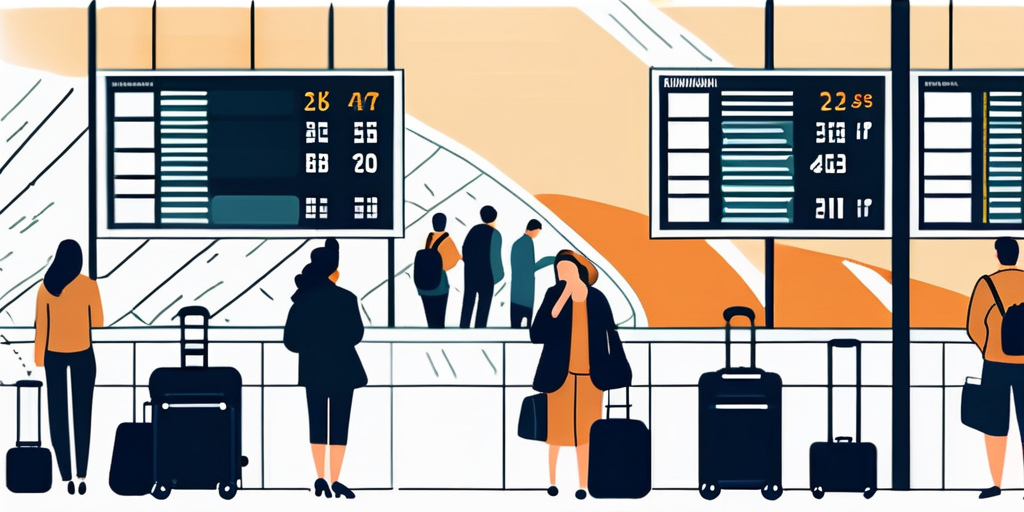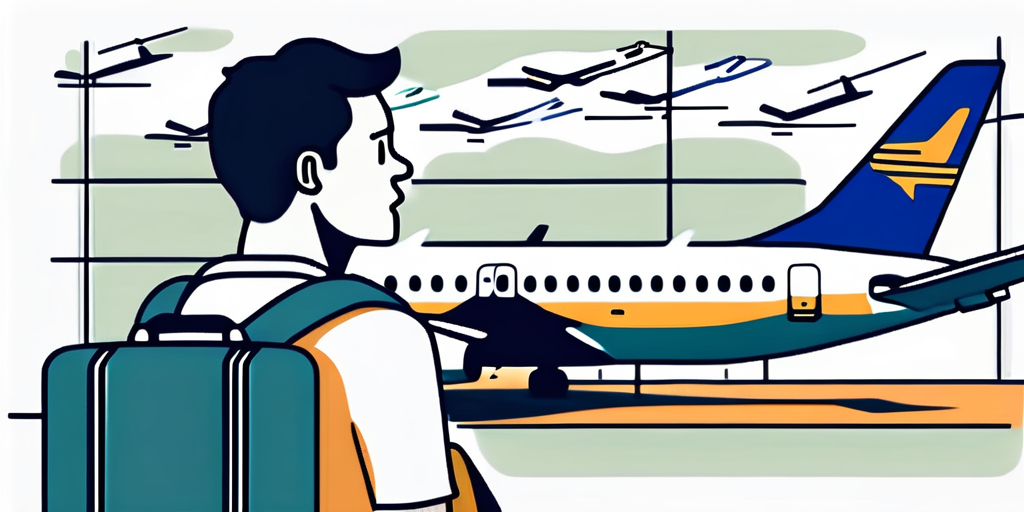Your Guide to EU Flight Delay Compensation
Delayed flight in the EU? Understand your rights for compensation. Learn about eligibility, claim process, and reimbursement.
Dealing with flight delays can be frustrating and inconvenient. However, if you are traveling within the European Union, there are regulations in place that can provide you with compensation for these delays. In this guide, we will walk you through the process of understanding and claiming EU flight delay compensation.
Understanding EU Flight Delay Compensation
The Basics of EU Flight Delay Compensation
EU flight delay compensation is a legal right for passengers who experience delays on flights departing from or arriving at European Union airports. The compensation is provided under EU Regulation 261/2004, which establishes certain passenger rights in cases of flight disruption.
 Under this regulation, passengers are entitled to compensation if their flight is delayed for more than three hours, in addition to other conditions that we will explore later in this guide. The aim is to provide passengers with financial support and encourage airlines to improve their operational efficiency
Under this regulation, passengers are entitled to compensation if their flight is delayed for more than three hours, in addition to other conditions that we will explore later in this guide. The aim is to provide passengers with financial support and encourage airlines to improve their operational efficiency
Why Is My Flight Delayed
The causes of flight delays are as varied as your options for airline snacks—meaning not a ton, but still a fair bit.
Operating a flight is challenging on so many different levels, largely because of all the different people involved.
On the one hand, there are factors that are under the direct control of the carrier, such as aircraft turnarounds between flights, passenger punctuality, technical and crew performance, etc.
There are perhaps even more factors that are outside of the airline’s control, such as weather, air traffic control, security, airport conditions, etc.
The reality is such that so long as airplanes continue flying, flight delays will be a part of the experience. According to the Bureau of Statistics, about 20.25% of all flights are delayed by 15 minutes or more in 2023. That's the most it's been in the past 9 years!
(During our airline ratings case study, we found that it's even closer to 24.30%)
Thankfully for air passengers, the Department of Transportation (DOT) lays some ground rules for air passenger rights in the US, while in Europe, EC261 is the reference.
But spoiler: your entitlement to flight delay compensation is a case-by-case affair.
Legal Framework for Flight Delay Compensation
Before delving into the specifics of eligibility and compensation calculation, it is essential to understand the legal framework that supports the EU flight delay compensation system.
EU Regulation 261/2004 was introduced to protect passengers' rights and ensure fair treatment in cases of flight delays. The regulation applies to all flights departing from EU member states, as well as flights arriving in the EU on European airlines.
It is important to note that the regulation covers not only delays but also other flight disruptions such as cancellations and denied boarding due to overbooking.
Now, let's take a closer look at the legal framework established by EU Regulation 261/2004. The regulation was enacted to address the growing concerns surrounding passenger rights and the need for a standardized compensation system. By implementing this regulation, the European Union aimed to create a fair and balanced approach to flight delays and disruptions.
Under this legal framework, airlines are required to compensate passengers for flight delays exceeding three hours.
The compensation amount varies depending on the distance of the flight and the length of the delay. For example, passengers on short-haul flights (up to 1,500 kilometers) are entitled to €250, while passengers on long-haul flights (over 3,500 kilometers) can receive up to €600 in compensation.
- Your flight needs to be delayed by at least 5 hours at departure to be eligible for a flight delay refund.
- Your flight must be delayed by at least 3 hours at arrival to be eligible for flight delay compensation.
- For a delay at departure of at least 2 hours, the airline must provide you with a meal (or meal voucher), refreshments, access to wi-fi, and 2 phone calls.
- For a significant delay at departure (5 hours or more), the airline must provide you with a hotel room and transportation between the hotel and the airport.
With our free flight delay compensation calculator, learn whether you're eligible for compensation and how much the airline may owe you, in just 2 minutes.
In addition to financial compensation, EU Regulation 261/2004 also outlines other passenger rights. These include the right to receive care and assistance during the delay, such as meals, refreshments, and accommodation if necessary. Furthermore, if the delay exceeds five hours, passengers have the right to choose between a full refund of their ticket or an alternative flight to their destination.
It is worth noting that airlines can avoid paying compensation if they can prove that the delay was caused by extraordinary circumstances beyond their control. These circumstances include severe weather conditions, political unrest, or strikes that affect the operation of the airline. However, it is the responsibility of the airline to demonstrate that they took all reasonable measures to prevent the delay or disruption.
In conclusion, EU flight delay compensation is a crucial aspect of passenger rights protection. The legal framework established by EU Regulation 261/2004 ensures that passengers are fairly compensated for flight delays and disruptions, while also holding airlines accountable for their operational efficiency. By understanding these regulations, passengers can assert their rights and seek the compensation they are entitled to.
Eligibility for EU Flight Delay Compensation
Criteria for Eligibility
To be eligible for EU flight delay compensation, certain criteria must be met:
- The flight must have departed from an EU airport or arrived at an EU airport on a European airline.
- The delay must be over three hours.
- The delay should not be caused by extraordinary circumstances beyond the airline's control, such as severe weather conditions or air traffic control strikes.
If these criteria are fulfilled, passengers are entitled to compensation ranging from €250 to €600 depending on the distance of the flight.
Exceptions to the Rule
While the EU regulations provide clear guidelines for flight delay compensation, there are exceptions to consider. In certain cases, the airline may not be liable to provide compensation even if the delay meets the eligibility criteria.
Exceptions, such as air traffic control decisions, a bird strike, or medical emergencies, can absolve airlines of their liability. It is important to be aware of these exceptions and check with the carrier or alternative sources to determine whether compensation can be claimed.
Additionally, it is worth noting that the process of claiming compensation for flight delays can sometimes be complex and time-consuming. Passengers may need to gather evidence, such as boarding passes and receipts, to support their claim. They may also have to navigate through the airline's customer service channels or even resort to legal action in some cases.
Furthermore, it is essential to be aware that the amount of compensation received may vary depending on the specific circumstances of the delay. Factors such as the distance of the flight, the length of the delay, and the airline's policies can all play a role in determining the final compensation amount. Therefore, it is advisable for passengers to familiarize themselves with the regulations and seek professional advice if needed to ensure they receive the appropriate compensation.
Calculating Your Compensation
Factors Affecting Compensation Amount
The amount of compensation you are entitled to for a flight delay depends on the distance of the flight and the duration of the delay. The EU regulation establishes three different compensation levels based on these factors.
For flights up to 1,500 kilometers, the maximum compensation is €250. For flights within the EU that exceed 1,500 kilometers, as well as for all other flights between 1,500 and 3,500 kilometers, the maximum compensation is set at €400. Finally, for flights exceeding 3,500 kilometers and not within the EU, the maximum compensation is €600.
How to Calculate Your Due Compensation
To calculate the compensation you are entitled to, determine the distance of your flight and the duration of the delay. You can use online tools and resources or consult airline specific compensation tables to simplify this process.
Once you have these details, you can match them with the appropriate compensation level outlined by the EU regulation and claim the corresponding amount.
With our free flight delay compensation calculator, learn whether you're eligible for compensation and how much the airline may owe you, in just 2 minutes.
It is important to note that the calculation of compensation is not limited to just the distance and duration of the delay. Other factors may come into play, such as the reason for the delay or whether the airline provided any alternative arrangements or assistance during the delay.
For example, if your flight was delayed due to extraordinary circumstances beyond the airline's control, such as severe weather conditions or air traffic control restrictions, you may not be eligible for compensation. However, if the delay was within the airline's control, such as technical issues or crew shortages, you may be entitled to compensation regardless of the distance and duration of the delay.
Furthermore, it is worth knowing that the compensation amounts mentioned earlier are the maximum limits set by the EU regulation. In some cases, airlines may offer lower compensation amounts voluntarily or as part of their own policies. It is always advisable to check with the airline directly or consult legal experts to ensure you are aware of your rights and the compensation you are entitled to.
Claiming Your Compensation
Steps to File a Claim
Filing a claim for EU flight delay compensation can be done directly with the airline or through specialized claim management companies.
You can check our complete article on flight delay claim right here
To claim your compensation, follow these steps:
-
Contact the Airline is the he first step in making a flight delay claim is to contact the airline directly. You can do this by phone, email, or through their website. Explain the situation, providing details such as your flight number, date, and the length of the delay. It's important to remain calm and polite during this communication, as it will set the tone for your claim.
-
Filling Out the Claim Form, once you have received the claim form from the airline, it's important to fill it out accurately and completely. Provide all the requested information, attach any supporting documentation, and double-check for any errors or omissions. Be thorough and include any additional relevant details that may strengthen your claim. Remember to keep a copy of the completed claim form and any supporting documentation for your records.
-
Keep copies of all correspondence with the airline is a really important part to help you justify your case and be able to prove your point.
-
Follow up on the claim if there is no initial response within a reasonable period. Insisting is important if you notice that you do not get any response from the Airline Company.
Dealing with Denied Claims
In some cases, airlines may deny compensation claims based on exceptional circumstances beyond their control or other justifications. If your claim is rejected, you can seek assistance from relevant national enforcement bodies or specialized organizations that advocate for passenger rights.
It is important to be persistent and assertive when dealing with denied claims, as the regulations are in place to protect passengers and ensure fair treatment.
Role of Airlines in EU Flight Delay Compensation
Responsibilities of the Airlines
Airlines have specific responsibilities when it comes to EU flight delay compensation. They are obligated to inform passengers of their rights under EU Regulation 261/2004 and provide prompt and clear communication in cases of flight disruptions.

If a flight is delayed, airlines must offer passengers assistance, such as meals and refreshments, accommodations, and transportation to and from the airport if necessary. Additionally, they should strive to provide alternate flights or refund options to affected passengers.
How Airlines Handle Compensation Claims
When receiving compensation claims, airlines are expected to handle them promptly and fairly. They should assess each claim based on the eligibility criteria and respond within a reasonable time frame.
While the claim process can vary between airlines, it is important for passengers to be aware of their rights and the airlines' responsibilities. Seeking guidance through official channels, such as the airline's customer service or regulatory bodies, can facilitate a smoother compensation claim process.
The amount of the compensation depends on multiple criteria, find out more by clicking here.
Conclusion
Understanding EU flight delay compensation can help you navigate the process and ensure fair treatment as a passenger. The regulations in place aim to safeguard your rights and provide financial support when flight disruptions occur.
By familiarizing yourself with the basics of EU flight delay compensation, eligibility criteria, the calculation process, and the steps to claim your compensation, you can confidently assert your rights and seek the compensation you are rightfully owed.
Remember, if you encounter any difficulties during the claim process or need further assistance, there are resources available to support you. Stay informed, be persistent, and advocate for your rights as a passenger in the European Union.
Ready to Claim Your Compensation?
If you've experienced a flight delay, cancellation, or overbooking, ClaimCompass is here to help you claim up to 600€ in compensation. Our team of experts will handle your claim every step of the way—from submitting it to the airline to taking legal action if necessary. With our no-win, no-fee policy, you have nothing to lose. Use our compensation calculator to check your eligibility for free and let us take care of the rest. Submit your claim with ClaimCompass today and secure the compensation you deserve.
How long does flight have to be delayed for compensation Europe?
In Europe, passengers may be entitled to compensation for flight delays under EU Regulation 261/2004. The duration of the delay required for compensation depends on the distance of the flight and certain other factors:
- Flights of 1,500 kilometers or less: Compensation may be due if the delay is over 2 hours.
- Flights between 1,500 and 3,500 kilometers: Compensation eligibility typically starts for delays exceeding 3 hours.
- Flights over 3,500 kilometers between an EU and a non-EU airport: Compensation may be owed if the delay exceeds 4 hours.
However, it's important to note that compensation may not apply if the delay is caused by extraordinary circumstances beyond the airline's control, such as severe weather or air traffic control issues. Passengers should review the specific regulations and contact the airline for clarification on compensation eligibility in case of a delay.
How much is EU 261 compensation?
The compensation amount under EU Regulation 261/2004 depends on the distance of the flight and the length of the delay. Here's a breakdown:
- For flights of 1,500 kilometers or less:
- €250 for delays of 3 hours or more.
- For flights between 1,500 and 3,500 kilometers:
- €400 for delays of 3 hours or more.
- For flights over 3,500 kilometers between an EU and a non-EU airport:
- €300 for delays of 3 to 4 hours.
- €600 for delays of 4 hours or more.
These compensation amounts are per passenger and are intended to cover inconvenience caused by the delay. However, compensation may not apply if the delay is caused by extraordinary circumstances beyond the airline's control. Passengers should contact the airline or seek legal advice if they believe they are entitled to compensation under EU Regulation 261/2004.
Can I get compensation for a 2 hour flight delay?
For flight delays of 2 hours, compensation eligibility can vary depending on several factors, including the airline's policies and the regulations in place at the departure and arrival locations.
In general, under EU Regulation 261/2004, passengers may not be entitled to compensation for delays of less than 3 hours, except in specific circumstances. However, some airlines may offer amenities or assistance for shorter delays, even if compensation isn't mandated.
Outside the EU, compensation policies may differ, and passengers should review the airline's policies and any relevant regulations to determine eligibility for compensation for a 2-hour flight delay. If in doubt, passengers can contact the airline directly for clarification on their compensation policies.
What flights are covered by EU261?
EU Regulation 261/2004, often referred to as EU261, covers flights departing from an EU airport, regardless of the airline, as well as flights arriving at an EU airport on an EU-based airline. Specifically, the regulation applies to the following:
- Flights departing from an airport located in an EU member state, regardless of the airline's nationality.
- Flights arriving at an airport located in an EU member state, provided that the airline is registered in an EU member state or Iceland, Norway, or Switzerland.
This means that flights within the EU, as well as flights from the EU to non-EU countries and vice versa, may be covered by EU261 if they meet the specified criteria. However, flights departing from non-EU countries to non-EU countries are generally not covered by EU261.
